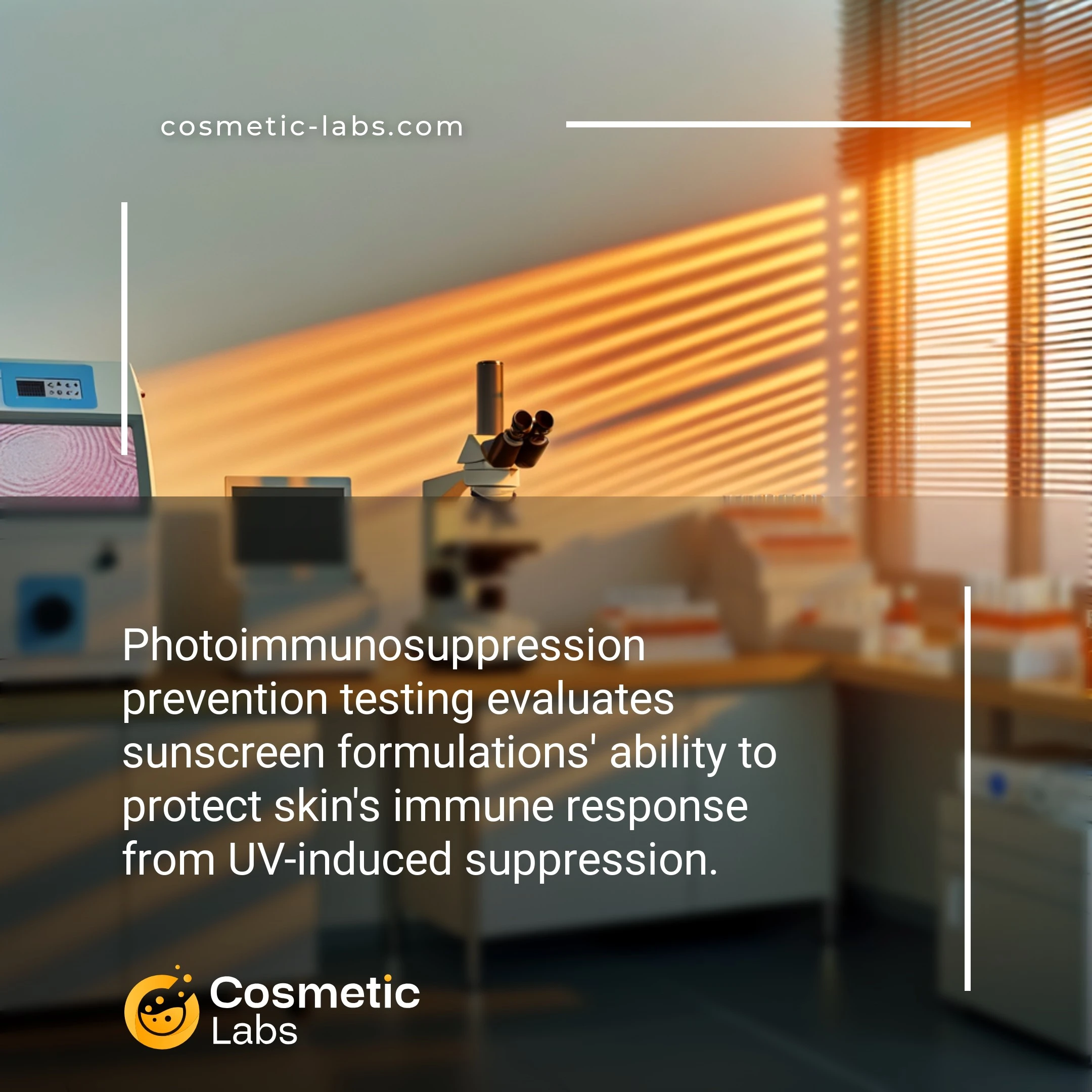Photoimmunosuppression Testing Services for Sunscreen

What is Photoimmunosuppression prevention testing?
Photoimmunosuppression prevention testing evaluates how well sunscreen formulations protect skin’s immune response from UV-induced damage. Labs measure immune cell function and cytokine production in treated versus untreated skin samples after controlled UV exposure. This testing reveals whether your SPF product maintains immune system integrity beyond basic sun protection—a differentiating factor many brands overlook when developing premium suncare products.
Why do you need this service?
Cosmetic labs use photoimmune suppression testing to validate sunscreen formulations before market launch, measuring how UV filters protect skin’s immune response from harmful radiation. This testing helps brands demonstrate that their SPF products maintain immune system integrity while blocking UV damage, supporting regulatory submissions and consumer safety claims for premium sun care lines.
Who provides Photoimmunosuppression prevention testing services?
All cosmetic labs providing Photoimmunosuppression prevention testing services
There is no company providing these services at the moment.
Photoimmunosuppression Prevention Testing Services
Photoimmunosuppression prevention testing validates your sunscreen formulations’ ability to protect skin’s immune response from UV damage. Labs on our platform run specialized assays that measure how well your products prevent UV-induced immune system suppression, a key factor in skin cancer development and photoaging.
In Vitro Immune Response Testing
Labs use Langerhans cell viability assays and cytokine production measurements to assess immune protection. These tests expose cultured skin cells to UV radiation with and without your sunscreen formulation. The results show how effectively your product maintains immune cell function under UV stress.
Testing protocols typically include:
- Contact hypersensitivity assays
- Dendritic cell activation markers
- Pro-inflammatory cytokine levels
- Antigen presentation capacity
This data helps you optimize SPF formulations and support regulatory submissions for immune protection claims.
Clinical Immune Function Studies
Human volunteer studies measure real-world immune suppression prevention through delayed-type hypersensitivity testing. Participants receive controlled UV exposure with your sunscreen applied, then undergo immune response challenges to assess protection levels.
Study designs include:
- Baseline immune response establishment
- UV exposure with product application
- Post-exposure immune function testing
- Statistical analysis of protection efficacy
These studies provide clinical evidence for marketing claims about immune system protection. Connect with specialized labs on our platform to discuss your photoimmunosuppression testing needs and timeline requirements.
Practical Applications of Photoimmunosuppression Prevention Testing
Cosmetic brands rely on photoimmunosuppression prevention testing applications to validate their sun protection formulations and meet regulatory requirements across global markets.
SPF Product Development and Reformulation
Labs conduct photoimmunosuppression assays during early formulation stages to screen UV filter combinations and optimize concentrations. This testing identifies which ingredients maintain immune function under UV exposure, preventing formulations that might compromise skin’s natural defense mechanisms.
Reformulation projects use these protocols when switching UV filters or adjusting concentrations. Teams can compare immune protection profiles between original and modified formulas, ensuring new versions don’t reduce photoprotective benefits. The testing typically takes 14-21 days and provides quantitative data on immune cell viability and cytokine production.
Regulatory Compliance and Market Entry
European markets require photoimmunosuppression data for certain SPF claims, making this testing necessary for product registration. Labs generate reports that demonstrate formulations don’t suppress local immune responses, supporting safety dossiers for regulatory submissions.
Brand owners use these test results to support marketing claims about immune-safe sun protection. The data helps differentiate products in competitive markets by demonstrating superior photoprotection that preserves skin immunity. Testing protocols follow standardized methods using human skin models or cell cultures to ensure reproducible results.
| Application Type | Testing Duration | Key Measurements | Regulatory Use |
|---|---|---|---|
| New Product Development | 14-21 days | Cell viability, cytokine levels | Safety documentation |
| Reformulation Validation | 10-14 days | Comparative immune response | Equivalency studies |
| Market Entry Support | 21-28 days | Full immune profile analysis | EU regulatory submissions |
Ready to validate your sun protection formulations? Connect with experienced cosmetic testing labs on our platform to discuss your photoimmunosuppression testing requirements and timeline.
